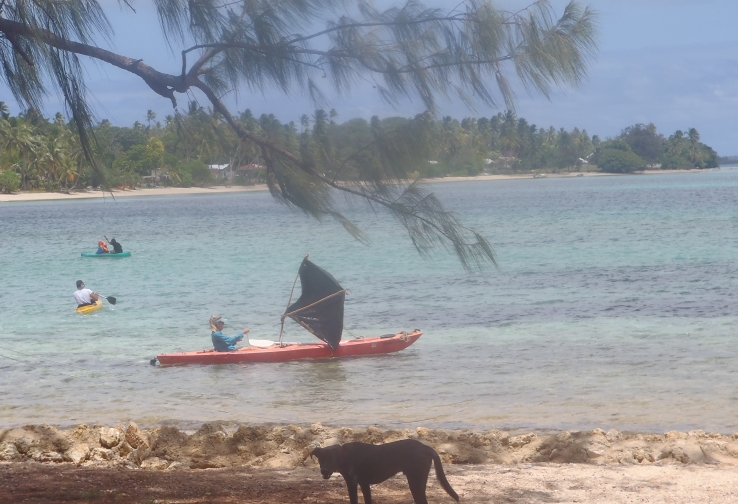Charmed, I’m Sure
We’ve now lived in the Kingdom of Tonga for one full month. It’s awesome here, and I say that after exploring only 3 of the 170 islands. We plan on staying in Vava’u through at least January to see a few more, and to soak up the sights and sounds of this special spot.
That means we’ll soon be waving goodbye to most of our sailing friends. Most yachties head south to New Zealand and Australia by November, steering clear of the hurricanes that spin through the tropical latitudes during the southern hemisphere’s summer season. Since we don’t have to worry about a storing a sailboat out of cyclone-prone areas, Rob and I plan to stay put as the air and water heat up. Plus, Rob rigged up this awesome trash bag sail on our friends’ double kayak, so we have some sweet wheels now.

We’re looking forward to experiencing the storm season, when the trade winds die, the tourists head home, and the locals flock to beaches for summer feasts. Here are just a handful of the reasons Tonga has charmed us into staying on her pretty shores:
- The kids all say “bye bye” instead of hello as you pass by.
- Baby pigs squeal and scatter as you walk or drive down the main street.
- Tongan feasts are weekly events, and include a LOT of meat, which is cooked in an umu with stones heated in a coconut-shell fire. Lamb and chicken are favorites, but puppy is not unheard of.
- Everyone sings aloud – and in harmony – to any song nearby, whether it’s rap, pop or church music.
- The cops drive people home from the bars when they close.
- Boundaries are fuzzy and the culture is communal, so people “borrow” what they need. Rob likes to “Tongan borrow” fruit, for instance.
- Tonga is the only kingdom in the Pacific, and the only country that never gave up autonomous rule.
- Only 40 of Tonga’s 170 islands are inhabited.
- Both men and women wear skirts with woven grass mats called ta’ovalas tied around the top of the skirt.
- The Kingdom has dozens of chiefs and nobles, along with the royal family. Commoners must speak a different language to nobles, and yet another separate language to address the royal family.



